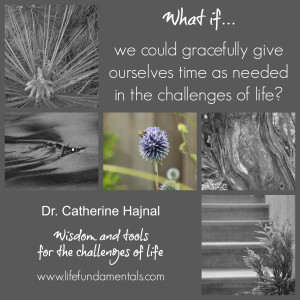 How long does it take to grieve a loved one who has died?
How long does it take to grieve a loved one who has died?
How long does it take to grieve an ending relationship?
How long does it take to make a career change?
How long does it to take move and settle in to a new city?
How long does it take to have cancer?
Often language implies there is both timing and an ending to these types of challenging life scenarios.
“You’ll be better in no time!”
“Give it a week and you should be back to normal.”
“You’ve been sick/grieving/grumpy/sad for long enough now.” Likely followed by a “Get over it.”
“I imagine you can have a new job and be settled within 6 months.”
Many of our corporate policies incorporate timelines and endings as well.
Three days of bereavement leave.
Two weeks of sick leave.
Six months of extended disability leave.
A month of accommodation benefits as part of a moving allowance.
These messages have us believing we can measure and monitor the events of our lives based on some chronological, prescribed time window.
Your body, mind, and spirit have their own sense of time.
The more work I do facilitating bereavement groups, the more I appreciate that the journey of grief takes as long as it takes. One thing I know for sure – we do not “get over” or “get through” a significant loss in 3 days.
When I think of my Grandmother who died six years ago it is always bitter sweet. Seeing a cookbook on my shelf that reminds me of her – a sweet memory – is often linked with a jolt of sadness – that I can no longer call her. That burst of grief is very real and while I no longer grieve her as I once did, I’m not “over her”, I still grieve from time to time.
And healing from my spinal fusion surgery – depending on how you want to measure it 6 weeks or years. My back pain sparked a period of deep introspection and I began healing my spirit before the actual surgery. My scar healed in a matter of weeks. It took at least a year for the bones to fuse. It took many moons for my body to begin to realize that when I was invited to an event, such as going to see an art exhibit, it didn’t have to go into resistance and protection mode. It wasn’t going to hurt any more, but parts of me weren’t aligned with that yet. How long does rewiring chronic pain take?
What if we could gracefully give ourselves the time needed in the challenges of life?
There are two Greek works for time – chronos and kairos.
“Chronos is clocks, deadlines, watches, calendars, agendas, planners, schedules, beepers. Chronos is time at her worst. Chronos keeps track. …Chronos is the world’s time. Kairos is transcendence, infinity, reverence, joy, passion, love, the Sacred. Kairos is intimacy with the Real. Kairos is time at her best. …Kairos is Spirit’s time. We exist in chronos. We long for kairos. That’s our duality. Chronos requires speed so that it won’t be wasted. Kairos requires space so that it might be savored. We do in chronos. In kairos we’re allowed to be … It takes only a moment to cross over from chronos into kairos, but it does take a moment. All that kairos asks is our willingness to stop running long enough to hear the music of the spheres.”
― Sarah Ban Breathnach
While I don’t necessarily agree that chronos is time at her worst – when scheduling an appointment for example, I’m glad there is a way to represent that in quantitative time – I do believe chronos time can be counter productive. Applying a time measurement to many aspects of life can set us up to hold ourselves to a standard that is not real, rather it is arbitrary. It can also feel like trying to live to a moving target.
Tool: How about stepping into life changes, growth, and healing without strict timelines? Rather than a focus on chronos time, how about exploring kairos time? It is not about speed. It is about being human. It is about allowing. It is about alignment. It is about knowing we have arrived, when we have arrived, not by the date on the calendar.
So the next time someone tells you how to heal faster, or says “You should be over it by now,” gently let them know you are gracefully living by kairos time.
